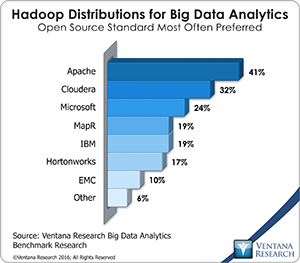On Monday, March 21, Informatica, a vendor of information management software, announced Big Data Management version 10.1. My colleague Mark Smith covered the introduction of v. 10.0 late last year, along with Informatica’s expansion from data integration to broader data management. Informatica’s Big Data Management 10.1 release offers new capabilities, including for the hot topic of self-service data preparation for Hadoop, which Informatica is calling Intelligent Data Lake. The term “data lake” describes large collections of detailed data from across an organization, often stored in Hadoop. With this release Informatica seeks to add more enterprise capabilities to data lake implementations.
This is the latest step in Informatica’s big data efforts. The company has been investing in Hadoop for five years, and I covered some of its early efforts. The Hadoop market has been evolving over that time, growing in popularity and maturing in terms of information management and data governance requirements. Our big data benchmark research has shown increases of more than 50 percent in the use of Hadoop, with our big data analytics research showing 37 percent of participants in production. Building on decades of experience in providing technology to integrate and manage data in data marts and data warehouses, Informatica has been extending these capabilities to the big data market and Hadoop specifically.
The Intelligent Data Lake capabilities are the most significant features of version 10.1. They include self-service data preparation, automation of some data integration tasks, and collaboration features to share information among those working with the data. The concept of self-service data preparation has become popular of late. Our big data analytics research shows that preparing data for analysis and reviewing it for quality and consistency are the two most time-consuming tasks, so making data preparation easier and faster would benefit most organizations. Recognizing this market opportunity, several vendors are competing in this space; Informatica’s offering is called REV. With version 10.1 the Big Data Management product will have similar capabilities, including a familiar spreadsheet-style interface for working with and blending data as it is loaded into the target system. However, the REV capabilities available as part of Informatica’s cloud offering are separate from those in Big Data Management 10.1. They require separate licenses and there is no upgrade path or option as a result sharing work between the two environments is limited. Informatica faces two challenges with self-service: how well users view its self-service capabilities and user interface vs. those of their competitors and whether analysts and data scientists will be inclined to use Informatica’s products since they are mostly targeted at the data preparation process rather than the analytic process.
The collaborative capabilities of 10.1 should help organizations with their information management processes. Our most recent findings on collaboration come from our data and analytics in the cloud research, which shows that only 30 percent of participants are satisfied with their collaborative capabilities. The new release enables those who are working with the data to tag it with comments about what they found valuable or not, note issues with data quality and point others toward useful transformations they have performed. This type of information sharing can help reduce some of the time spent on data preparation. Ideally these collaboration capabilities could be surfaced all the way through the business intelligence and analytic process, but Informatica would have to do that through its technology partners since it does not offer products in those markets.
Version 10.1 includes other enhancements. The company has made additional investments in its use of Apache Spark both for performance purposes and for its machine-learning capabilities. I recently wrote about Spark and its rise in adoption. More transformations are implemented in Spark than in Hadoop’s MapReduce, which Informatica claims speeds up the processing by up to 500 percent. It also uses Spark to speed up the matching and linking processes in its master data management functions.
I should note that although Informatica is adopting these open source technologies, its product is not open source. Much of big data development is driven by the open source community, and that presents an obstacle to Informatica. Our next-generation predictive analytics research shows that Apache Hadoop is the most popular distribution, with 41 percent of organizations using or planning to use this distribution. Informatica itself does not provide a distribution of Hadoop but partners with vendors that do. Whether  Informatica can win over a significant portion of the open source community remains a question. Whether it has to is another. In positioning release 10.1 the company describes the big data use cases as arising alongside conventional data warehouse and business intelligence use cases.
Informatica can win over a significant portion of the open source community remains a question. Whether it has to is another. In positioning release 10.1 the company describes the big data use cases as arising alongside conventional data warehouse and business intelligence use cases.
This release includes a “live data map” that monitors data landing in Hadoop (or other targets). The live data map infers the data format (such as social security numbers, dates and schemas) and creates a searchable index on the type of data it has catalogued; this enables organizations to easily identify, for instance, all the places where personally identifiable information (PII) is stored. They can use this information to ensure that the appropriate governance policies are applied to this data. Informatica has also enhanced its security capabilities in Big Data. Its Secure@Source product, which won an Innovation Award from Ventana Research last year , provides enterprise visibility and advanced analytics on sensitive data threats. The latest version adds support for Apache Hive tables and Salesforce data. Thus for applications that require these capabilities a more secure environment is available.
The product announcement was timed to coincide with the Strata Hadoop conference, a well-attended industry event that many vendors use to gain maximum visibility for such announcements. However, availability of the product release is planned for the second quarter of 2016. As an organization matures in its use of Hadoop, it will need to apply proper data management and governance practices. With version 10.1 Informatica is one of the vendors to consider in meeting those needs.
Regards,
David Menninger
SVP & Research Director












